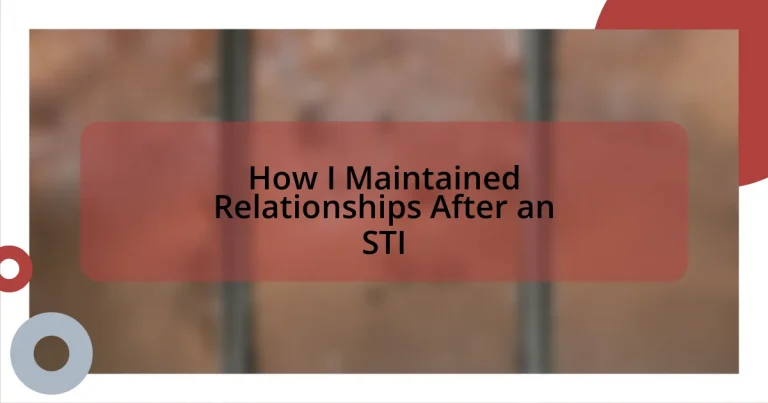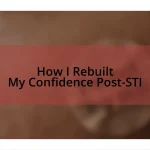Key takeaways:
- Open communication fosters trust, intimacy, and vulnerability in relationships, especially when discussing sensitive topics like STIs.
- Sharing your STI status requires careful timing, empathy, and the willingness to create a safe space for dialogue.
- Consistent conversations, setting boundaries, and practicing self-compassion strengthen relationships and emotional health.
- Professional support and therapy can provide valuable guidance and reassurance in navigating personal and relational challenges.
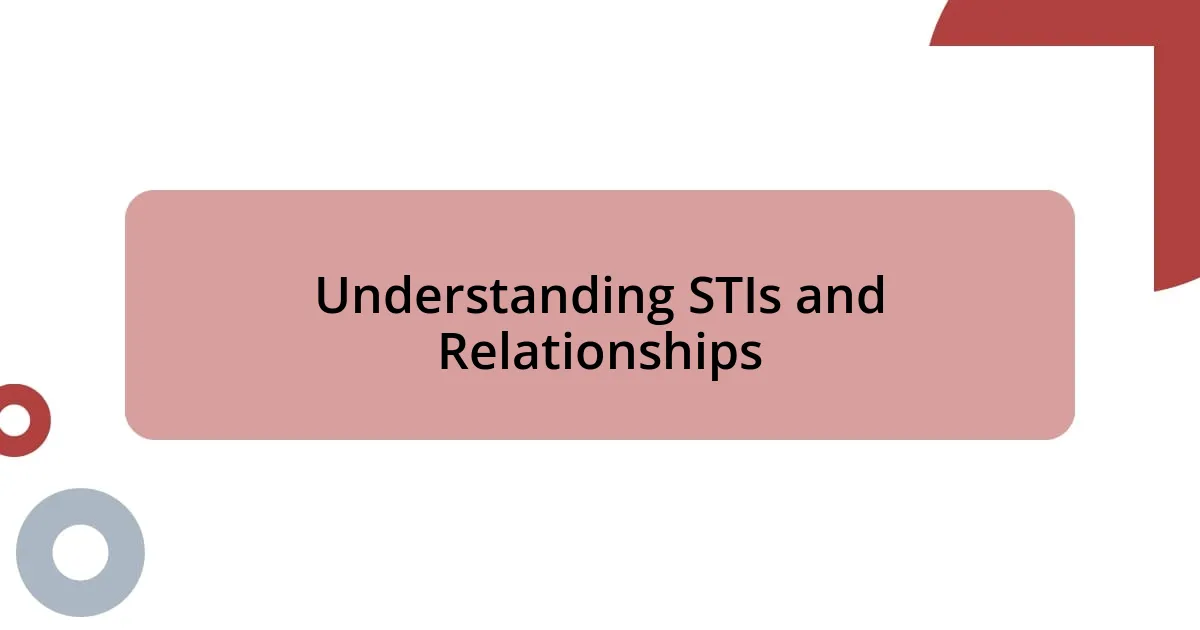
Understanding STIs and Relationships
Understanding STIs can be daunting, especially when it comes to relationships. I recall the moment I had to face my partner and share my diagnosis. The thought of disappointing someone I cared for deeply was overwhelming, but I realized that open communication could either strengthen or fracture our connection.
It’s natural to wonder how an STI will affect intimacy, trust, and overall relationship dynamics. When I was navigating this challenging journey, I often asked myself, “Will they still love me the same?” Those moments of uncertainty made me appreciate the importance of honesty, not just regarding health, but in building a foundation of trust that nurtured our bond.
As I interacted with others who faced similar situations, it struck me how emotional vulnerability plays a vital role in relationships. I noticed that when I shared my fears and insecurities, it not only alleviated my anxiety but also encouraged my partner to open up about their concerns. In those exchanges, I learned that addressing STIs is less about the stigma and more about fostering a deeper understanding of one another’s experiences and feelings.
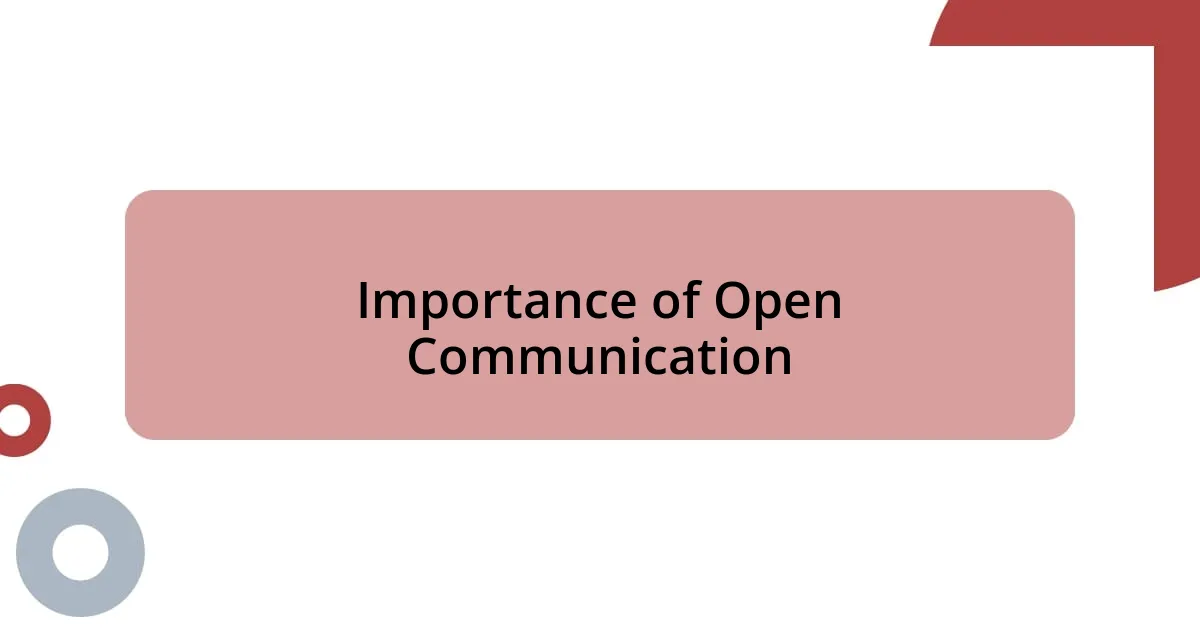
Importance of Open Communication
Open communication is absolutely vital when dealing with the reality of an STI. I remember the first time I revealed my situation to my best friend; her supportive reaction reassured me that our bond was unshakeable. When I chose honesty over shame, it transformed our relationship, paving the way for deeper conversations about health and boundaries that would have never occurred otherwise.
In my experience, the fear of judgment can be paralyzing. I still recall a moment with a potential romantic partner, where I hesitated to mention my STI status. Breaking the silence felt like removing a weight from my shoulders. Once I shared the information, not only did we create a safer space for each other, but it also deepened our trust. This openness helped us build a relationship where both our concerns were heard and validated, allowing us to explore the relationship without the heavy burden of unspoken fears.
When I reflect on those moments of honest communication, I realize there’s an immense power in vulnerability. It brings a unique intimacy; sharing my experience allowed the other person to share theirs, creating a bond grounded in empathy and understanding. This connection was not just about managing the STI itself but about fostering an environment where both of us could discuss our health and emotions freely, reminding us that love and support can thrive even in the most challenging of circumstances.
| Open Communication | Closed Communication |
|---|---|
| Builds trust and intimacy | Creates distance and misunderstanding |
| Encourages vulnerability | Increases anxiety and fear |
| Facilitates deeper discussions about health | May lead to health misinformation |
| Promotes emotional support | Can foster feelings of isolation |
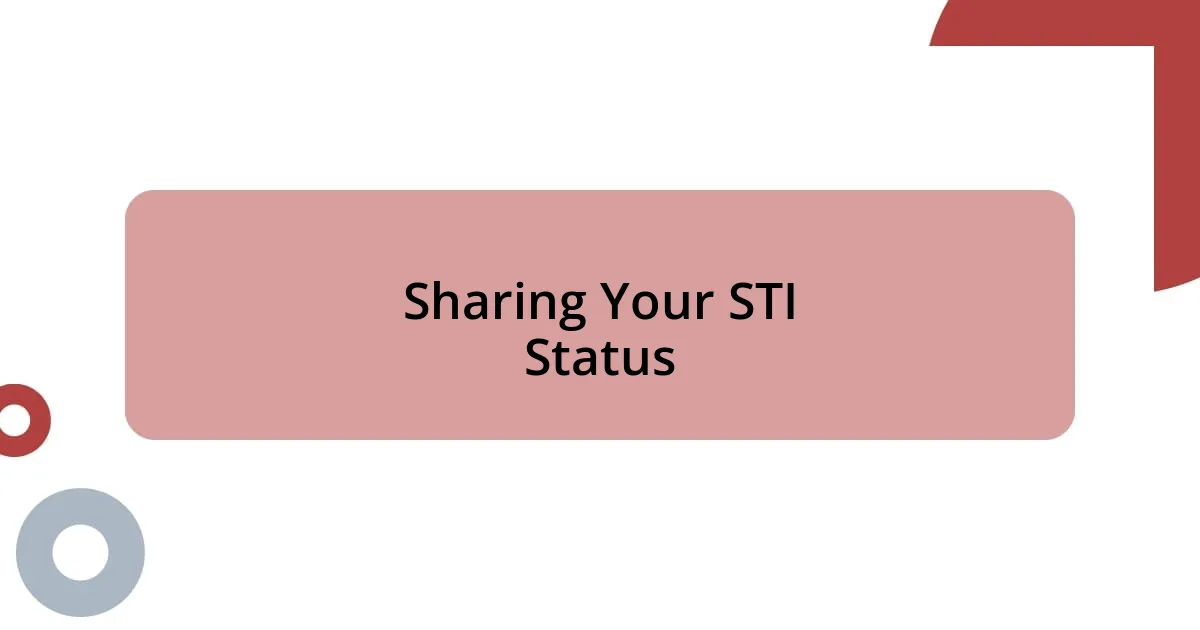
Sharing Your STI Status
Sharing your STI status is undeniably a delicate matter, but it’s an essential step in nurturing trust and connection. I vividly remember one evening, sitting across from a close friend who had just opened up about her own health struggles. It struck me how that moment of mutual sharing was not just about our STIs; it showed how vulnerability can cement relationships. When I finally disclosed my own status, I felt a wave of relief wash over me. Instead of judgment, I was met with compassion—a reminder that honesty often sprinkles strength into our connections.
When deciding to share your STI status, consider these key points:
- Choose the Right Moment: Timing can significantly influence how your message is received. I found that discussing it in a quiet, private setting worked best for me.
- Be Direct But Compassionate: Clarity is crucial. I learned that being straightforward, while also showing empathy, helps soften the delivery of difficult news.
- Acknowledge Their Feelings: It’s important to give the other person space to process their emotions. I always made it a point to ask how they felt after sharing my status, which opened the door for dialogue.
- Educate Together: If they have questions, offering to explore the facts of STIs together can foster a sense of partnership.
- Respect Their Boundaries: Understand that they might need time to think. I discovered that allowing space can be just as crucial as the conversation itself.
These strategies have helped me not only communicate effectively but also deepen the bonds I share with those I care about.
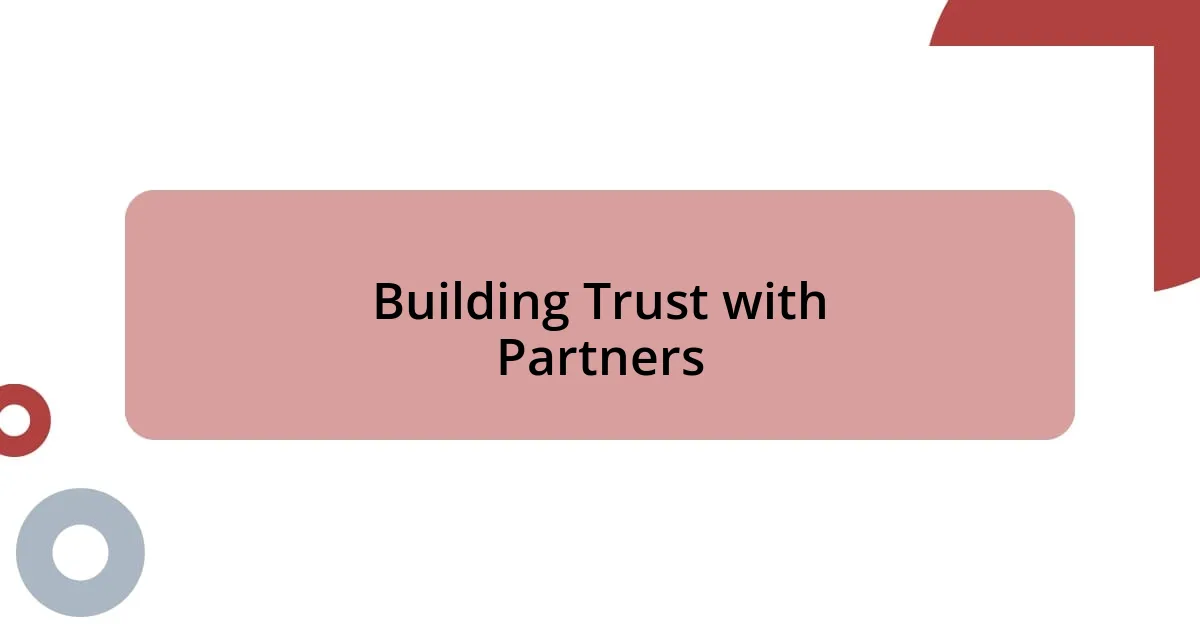
Building Trust with Partners
When it comes to building trust with partners, I realized the importance of consistent, open conversations. One night, while sharing a cozy dinner at home, I looked into my partner’s eyes and confessed my ongoing fears about intimacy after my diagnosis. That dialogue became a pivotal moment; it was as if we were peeling back layers of vulnerability together, allowing trust to blossom in a place where previously only uncertainty existed.
It’s fascinating how acknowledging the elephant in the room can lead to surprising connections. I once found myself hesitating before a date, worrying about how my STI status would affect the evening. Instead of dancing around the topic, I chose to be upfront about it. To my surprise, this honesty not only eased my anxiety but also made my date feel comfortable enough to share their own health concerns. This mutual vulnerability paved the way for deeper trust and understanding, something I hadn’t anticipated.
I’ve also learned that trust is reinforced through small, thoughtful gestures. After discussing my STI status, I surprised my partner with a heartfelt note expressing appreciation for their understanding. Those little moments of recognition can solidify trust, reminding partners that they are navigating a shared journey together. Trust grows over time, and I often wonder: how can we create an environment where honesty thrives in all our relationships? For me, the answer lies in being more open and supportive than I ever imagined.
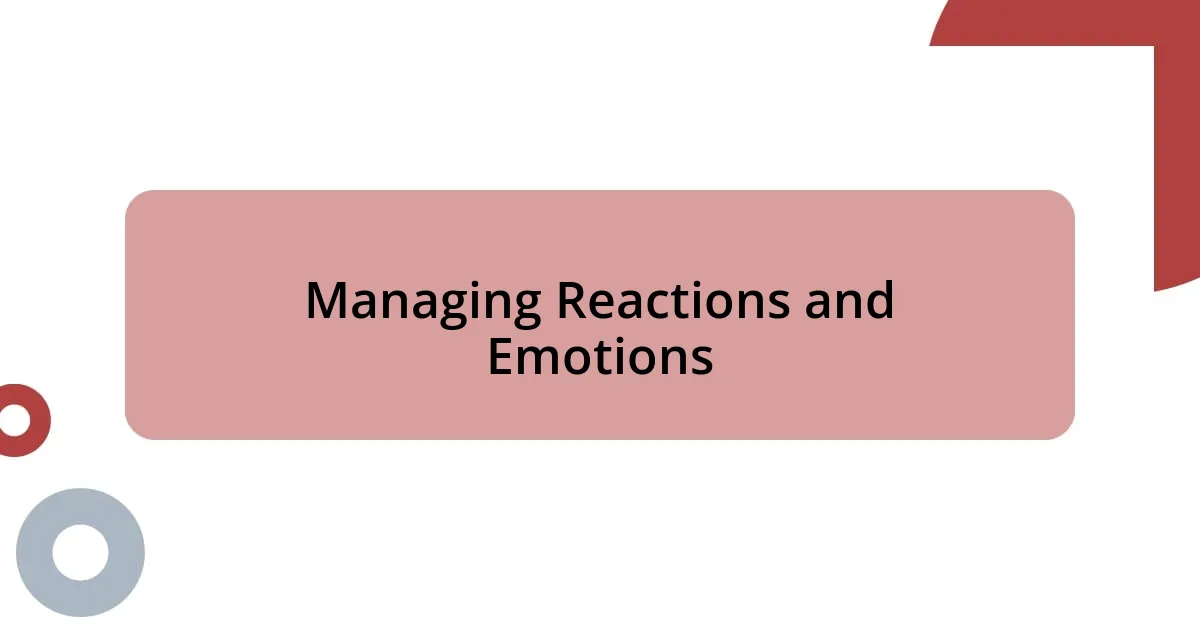
Managing Reactions and Emotions
I remember the first time I felt that tight knot of anxiety in my stomach after disclosing my STI status. My partner’s initial silence was unbearable, yet I realized that how I managed my own emotions played a huge role in shaping our discussion. By taking a deep breath and showing my vulnerability, I helped pave the way for an open dialogue about fear, confusion, and ultimately, love.
Navigating through someone else’s reaction can be tricky. When my best friend reacted with shock instead of understanding, I made a conscious choice to stay calm and empathetic. I shared my own fears about how this could change our friendship, which created a safe space for her to express her feelings. Isn’t it fascinating how our honesty can turn a potentially harsh moment into an opportunity for deeper connection?
Over time, I’ve learned the importance of checking in with myself during these conversations. After discussing sensitive topics, I often reflect on my feelings—checking my emotions helps me gauge whether I need to reach out for additional support or simply breathe and regroup. Has anyone else felt that internal shift after such discussions? I have, and recognizing those feelings has helped me maintain not only my relationships but also my emotional health.
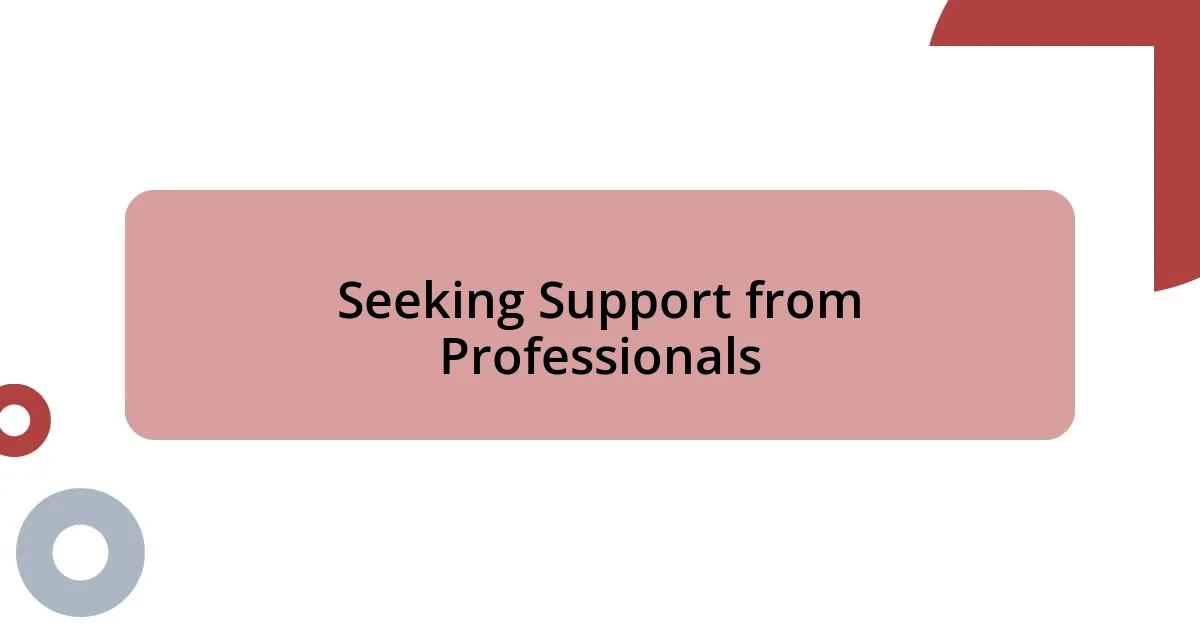
Seeking Support from Professionals
Sometimes, reaching out to professionals can be a game-changer. I vividly remember the first time I decided to talk to a therapist after my diagnosis. Sitting in that cozy office, I felt an immediate sense of relief as I shared my concerns about intimacy and relationships. The therapist guided me to explore my feelings and offered strategies that helped me articulate my thoughts better. Have you ever felt that weight lift when speaking with someone who truly understands?
I also found value in support groups. Attending my first meeting, I was overwhelmed by a mix of emotions—fear, curiosity, and a sense of camaraderie. Hearing others share their stories reminded me that I wasn’t alone in my journey. The collective strength in that room was palpable, and I left feeling empowered. Isn’t it fascinating how sharing experiences can create such a profound connection with others?
Moreover, I reached out to a healthcare provider who specialized in sexual health. Their insights on managing my STI holistically were invaluable. We discussed not just medical treatment but emotional well-being too, and that balanced perspective transformed my approach to relationships. I learned that seeking expert guidance can enhance not just your personal understanding but also how you engage with those around you. How has professional support shaped your experience? It can open doors to new perspectives and healing pathways that we sometimes overlook.
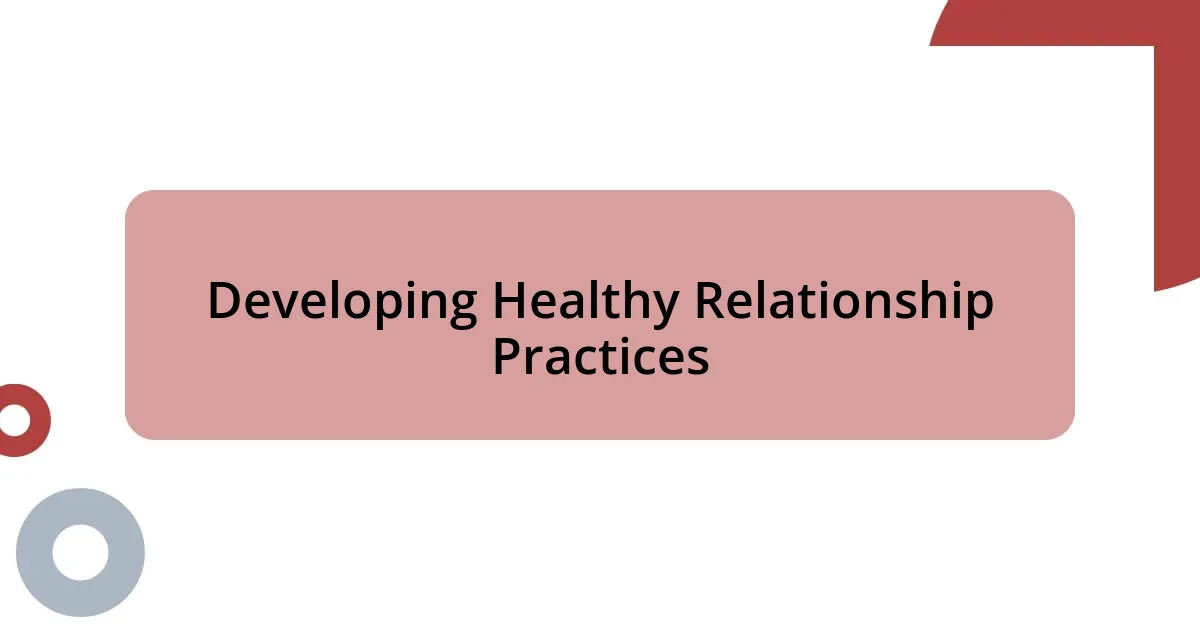
Developing Healthy Relationship Practices
Developing healthy relationship practices is vital, especially after navigating the complexities of an STI. I recall a time when I decided to establish more consistent communication with my partner. We made it a point to have weekly check-ins, creating an open space where we could discuss everything from our emotions to our future goals. Isn’t it amazing what regular, honest conversations can achieve in strengthening bonds?
Sometimes, I’ve found that creating boundaries is just as important as being open. There was a moment when I realized I needed to articulate my comfort levels regarding intimacy and communication. Setting those boundaries not only protected my feelings but also fostered a mutual respect that enriched our relationship. Have you ever felt that clarity after defining what you need?
Also, I realized that practicing self-compassion was instrumental in my journey. I learned to forgive myself for the past and focus on building a positive future. This shift in mindset helped me approach my relationships with more kindness, making it easier for my loved ones to engage with me genuinely. Reflecting on my journey, I often ask myself: how does self-love influence the way we connect with others? For me, it’s been a transformative realization that has reshaped my interactions.












